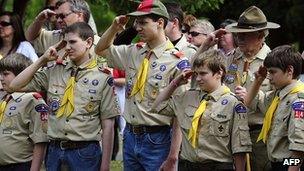Boy Scouts release files on suspected child sex abusers
- Published

The Boy Scouts have fought efforts to have the files made public
The Boy Scouts of America has disclosed 14,500 pages of secret documents on men suspected of sexually abusing children, after a lengthy legal battle.
The Oregon Supreme Court ordered the files from 1959 to 1985 to be released, despite the Boy Scouts' objections.
The Associated Press reports that the dossier shows how scout leaders, police, prosecutors and mayors hushed up numerous allegations of abuse.
The organisation has said it did all it could to protect boys from abuse.
The Boy Scouts has pledged to re-examine the files and report offenders who were not investigated at the time.
Psychiatric treatment
The organisation launched a legal battle to keep the documents sealed, but the Oregon Supreme Court ruled in June they could be made public with the victims' names omitted.
Many of the files unsealed on Thursday have been written about before, but this is the first time those from 1959 to 1971 have been disclosed.
Kelly Clark, a lawyer in the city of Portland, released the files.
He has been in possession of them since winning a case in April 2010 against the Boy Scouts on behalf of a man who was molested in the 1980s by an assistant scoutmaster already known to have abused other boys.
A court awarded the plaintiff nearly $20m (£12.4m).
Files on 1,200 suspected abusers were used in evidence in that case.
"You do not keep secrets hidden about dangers to children," Mr Clark told a news conference in Portland on Thursday.
The Associated Press says the documents show that in many instances the files succeeded in keeping paedophiles out of Scouting, but many times they did not.
According to a recently released report from the Boy Scouts, police were notified in two-thirds of alleged abuse cases from 1965-1985.
But in many cases, although suspected and confirmed abusers were urged to resign, the authorities were never told.
In some cases, offenders were allowed to re-join the youth group after psychiatric treatment.
But some of those men went on to molest more boys, Boy Scout officials and lawyers for plaintiffs have said.
Correspondents say the release of the files could lead to legal action against the Boy Scouts.
On Wednesday evening, Wayne Perry, President of Boy Scouts for America, conceded its response to the incidents had been "plainly insufficient, inappropriate and wrong," Reuters news agency reported.
Soon after the association was founded in 1910 in Irving, Texas, the Boy Scouts began to keep records tracking abusers.
Files released in 1991 - spanning incidents from 1971 to 1991 - also showed a pattern of failure to report sexual abuse to the police, even when a confession had been made.